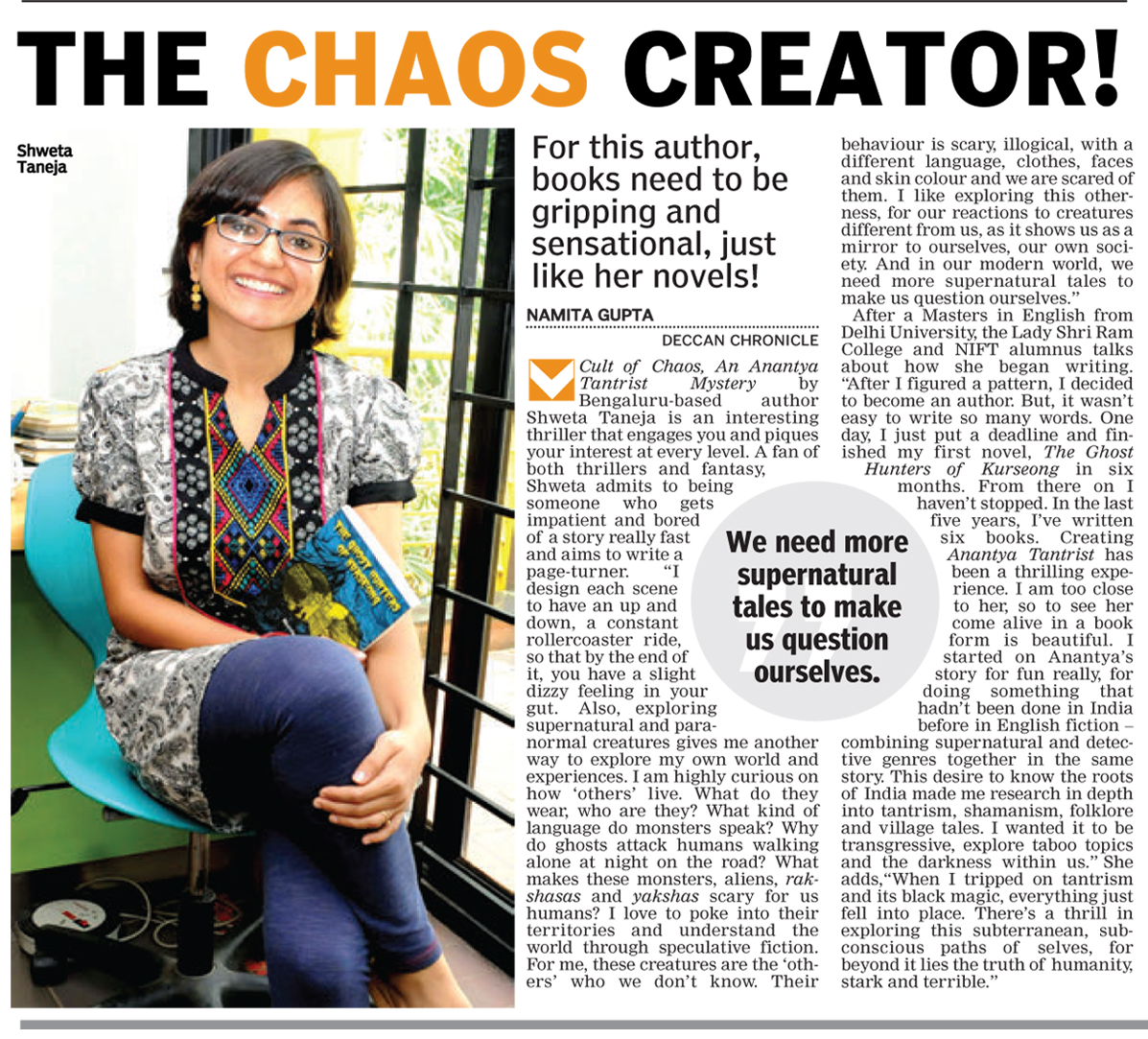Having been part of media for a long time, I know how easily and how fast people working there tend to forget you, moving on to the next thing they haven’t covered. But oh my, isn’t it fabulous to have that 15 seconds of attention? I feel like that now, when I post two really, really good interviews in different papers that came out a week or so back, both talking about chaos and supernatural tales and all things I love about Cult of Chaos. Check them out.
This came out in Deccan Chronicle and I haven’t been able to find a e-link for it. They used photographs from the last year’s coverage when I was doing detective workshops for The Ghost Hunters of Kurseong.

Meanwhile at Asian Age, the really polite Rohini who took my interview, told everyone about the book and mentioned my love of folklores. Read the complete article here or below.
====
Shweta Taneja’s new book features India’s first woman tantrik crime buster, and marries the author’s twin passions: Detective fiction and fantasy
An adventure based in the “supernatural underworld of Delhi”, featuring India’s first “tantrik woman detective” — Shweta Taneja’s new book Cult of Chaos promises to be a crime-busting story unlike any other. Featuring Anantya Tantrist, a “spunky 23-year-old, gaali-spewing, beedi-smoking fearless tantrik who solves crimes”, Cult of Chaos combines its creator’s twin passions — detective fiction and fantasy.
It was when Shweta was working on a graphic novel called The Skull Rosary (which collated the occult tales of Shiva) that she got deeply interested in tantrism and the occult. “I started to explore tribal folklore, oral stories, goddess cults and non-authoritative tales in our villages. These tales, with their violent, sensually rich content surprised and fascinated me,” recounts Shweta. “Then one day, while reading a detective novel, the idea of creating a tantrik detective suddenly struck me. And I had a name for her: Anantya Tantrist, a leftover from a previous unfinished novel. Before I knew it, I had the beginnings of Cult of Chaos.”
Shweta spent the next year researching practising tantriks, shamans and superstitions. Articles, scholarly books, sensational texts even whispered stories, all of these provided material for her story. Then there was the daily newspaper, which also provided enough fodder for the dark details of her novel. “There’s nothing better than a newspaper to give you ideas. It has enough horror, disgust, hatred, violence, evil in its pages to keep your creativity flowing,” says Shweta. “There were so many scenes in the book that have been inspired by real incidents, things I read in the news. Not only about superstition or witch hunting, but also something that a crass politician would’ve said when yet another woman got raped. Everyday domestic violence, which is reported in a single paragraph, taken verbatim from police notes or crimes of caste and religion which are all about power — there’s no dearth of inspiration in our country, especially when one is writing a thriller.”
With so much material to draw on, Shweta knew Anantya’s adventures wouldn’t be ending with one book. She’s already busy at work on a second story, set among “Delhi’s rich socialites who’re abusing a supernatural species for immortality” and a third, which will see the action shift to Varanasi as Anantya works on a case that will force her to confront her past.
“The more I write about Anantya, the more I continue to be spellbound with her and the world she inhabits,” says Shweta of her protagonist. “She’s completely opposite to all ideas of ‘decent’ women we have as a society… I think she has come from the desires of women of this country, the ones who have had it with restrictions and men keeping them safe. I think she is born from the frustration of being an independent woman and having to protect your choices, defy authorities, families, every step of way. I have tried to break gender boundaries with her character… I am freer, more confident today, because I wrote her. And I am hoping reading about her, has the same effect on other women and girls too. Sort of what Superman or Spiderman or Salman Khan has on boys. We need that for women.”
=====
As I was saying, isn’t attention so fabulous? Sad that it goes away in those mere 15 seconds. Still, I am rather enjoying the tick-tock in my favour. 🙂


